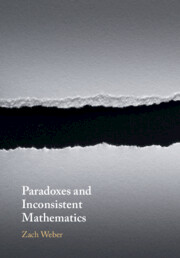6 - Arithmetic
from Part III - Where Are the Paradoxes?
Published online by Cambridge University Press: 08 October 2021
Summary
This chapter follows the axiomatic development of elementaryarithmetic. Starting from Peano’s postulates, somefundamental properties of natural numbers are derived, concerningaddition, multiplication, and order. If further assumptions aboutmathematical induction are made, then famous results about primenumbers can be established, including the fundamental theorem ofarithmetic (unique prime factorization) and Euclid’s theoremabout the infinitude of primes. Some simple facts about even and oddnumbers lead to the original limitive diagonal theorem: that thesquare root of 2 is irrational. Features of working withoutcontraction are highlighted.
Keywords
Information
- Type
- Chapter
- Information
- Paradoxes and Inconsistent Mathematics , pp. 189 - 211Publisher: Cambridge University PressPrint publication year: 2021
